How to live well: 1st meeting - values, self-determination theory, roles & goals
Last updated on 28th March 2020
"When I get to heaven, they will not ask me 'Why were you not Moses?'. They will ask 'Why were you not Susya? Why did you not become what only you could become?'" Susya, a Hasidic rabbi
"Let the beauty we love be what we do. There are hundreds of ways to kneel and kiss the ground." Jalal al-Din Rumi

key points of the first meeting: This 10-session training - "How to live well - a shared exploration" - is rich with information and ideas. It is informed by a state-of-the-art, positive psychology overview of how we can flourish more fully as human beings. Because there is so much good material here, it's helpful to understand that in many ways the core message both of this first meeting and of the course as a whole is that living with a balance of "Spine" and "Heart", and trying to support others in doing the same, is central to building wellbeing really well for ourselves, for those around us, and for the wider environment.
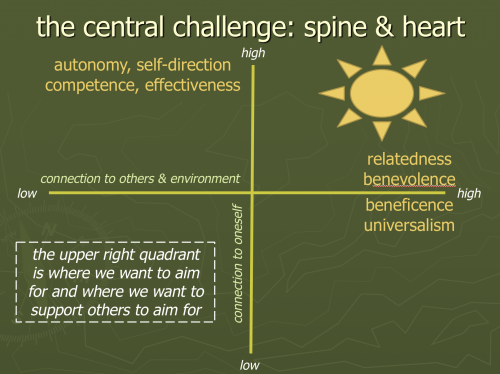
Fascinatingly, "Spine" and "Heart" are both the values (Schwartz's Self-Direction, Benevolence & Universalism) that can be the foundation of our actions and also the needs (Self-Determination Theory's Autonomy, Competence, Relatedness & Beneficence) that - when we meet them - are likely to nourish us most deeply. And this is true for our lives as a whole and for each day. We do well both to use these Values and Needs as a compass bearing for the whole journey of our lives ... and also for each daily step of the adventure. When asked about enlightenment, the Zen master Shunryu Suzuki replied "To reach the other shore with each step of the crossing is the way of true living".
introduction & overview: Yesterday was the first meeting of the ten-session "How to live well - a shared exploration" training. I've already put up a post on "How to live well - a shared exploration: course questionnaires". These online assessment measures are primarily focused on levels of personal well-being. This first evening I also asked everyone to complete the 10-item ReQol as a quick sampling of level of ill-being. The material we'll touch on over the ten sessions is: 1st evening - values, self-determination theory, roles & goals; 2nd evening - mindset, motivation, positive emotions, exercise & sleep; 3rd evening - willpower, wooping, diet & dependencies; 4th evening - coping with difficulties, the mindbus, compassion, mindfulness & reappraisal; 5th evening - positivity, savouring & gratitude; 6th evening - 'work in the world', strengths & deliberate practice; 7th evening - relationships, roles, Dunbar, needs & dyads; 8th evening - nourishing relationships, conflict & wisdom, and attachment; 9th evening - social identity theory, strength of weak ties & Fredrickson's emotional resonance; 10th evening - review & next steps.
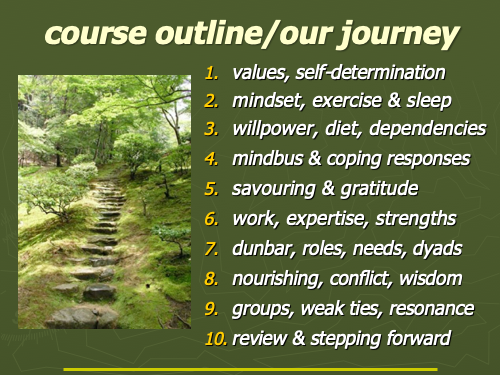
I'm now going to describe what we covered in the first session of this course (and provide further background to the areas we explored). If you're looking for a reminder of the "Home practices" requested for this first week of the training, see details at the end of this post. So, after an initial welcome, I explained that the course can be seen as an overlap between the following 3 components:
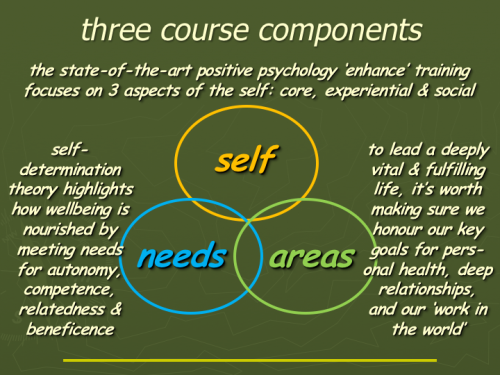
I asked everyone to think a bit about what they personally most wanted to get from coming to the course. (If you're following this training online, then it's likely to be a good idea if you too write down what you'd most like to achieve through following the course over the weeks ahead.) We then paired up, so everyone had a chance to meet a fellow course member a little more deeply, and to share our individual hopes. After this we came back to the full group and each introduced ourselves, explaining what we each most wanted to get from the course ... and I wrote all this up onto A1 flip chart sheets that we'll return to further into the training to try to make sure each of us is getting what we most hope for on this shared journey. The title of the course is "How to live well - a shared exploration". In many ways, I'm the 'general expert' here and each individual participant on the course is a 'specific expert'. So I've been fascinated by Wellbeing and How to live well for decades. I read philosophy at Cambridge to explore these issues, and then decided to 'construct a job' that allowed me to continue this exploration - hence becoming a doctor, group facilitator, meditation teacher, and psychotherapist. As the 'general expert', I'll share a large amount of lived experience & developing scientific understanding. You know much more about your own situation, and what's most relevant to you than I ever will. You're the 'specific expert'. If we put my general understandings & your specific understandings together, we should make a good team for helping you get as much as possible from this 10-session training. It's an adventure, a quest, a pilgrimage that we're undertaking like a band of fellow-explorers. I hope you enjoy, at least bits of it, very much. Remember the lovely Thich Nhat Hanh quote "There is no way to happiness; happiness is the way".
1st course component: I explained (as illustrated in the slide above), that the structure of the course is heavily influenced by Ed Diener & colleagues state-of-the-art ENHANCE research intervention, which you can read more about at "ENHANCE: Design and rationale of a randomized controlled trial for promoting enduring happiness & well-being" with the full text freely available on Researchgate. Its abstract includes the comment "Individuals who are higher in subjective well-being not only feel happier, they are more likely (to) have fulfilling relationships, increased work performance and income, better physical health, and longer lives. Over the past several decades, the science of subjective well-being has produced insights into these benefits of happiness, and — recognizing their importance — has begun to examine the factors that lead to greater well-being, from cultivating strong relationships to pursuing meaningful goals. However, studies to date have typically focused on improving subjective well-being by intervening with singular constructs, using primarily college student populations, and were short-term in nature ... In the present article, we describe a comprehensive intervention program including 3-month initial treatment followed by a 3-month follow-up ... Our primary outcome is change in subjective well-being across treatment (3 months) and follow-up (6 months) ... We hope to provide researchers, practitioners, and individuals with an evidence-based treatment to improve happiness and subjective well-being." Mm ... what's not to like! And these hopes seem to have been well-founded. Key trial results were reported at a conference earlier this year - see "Delivering happiness online: A randomized controlled trial of a web platform for increasing subjective well-being" - with the freely downloadable Researchgate extended abstract stating "We found significant effects of the ENHANCE program on life satisfaction (p = .007), as well as on positive affect (p = .038). We did not find any curvilinear effects of time, suggesting that the gains in life satisfaction and positive affect persisted between the post test and the 6-month follow-up ... The program also produced benefits for physical and mental health. Participants felt less depressed and stressed and ... from pre- to post-test, participants in the program also reported experiencing fewer health-related symptoms, including headache, pains, dizziness, coughing, sneezing, and sore throat." Good stuff ... and online administration using a specialised web platform seemed as effective as face-to-face delivery. Great!
Fascinatingly the ENHANCE programme began with a focus on Values. This downloadable 6-slide Powerpoint sequence (that I print out as a 6-miniatures-to-a-page black & white handout) highlights the importance of this area. Below is an illustrative slide and here a link to a 10 minute video giving more information on the slides. I particularly focus on Professor Shalom Schwartz's research on Values. For more details see the second half of the post "Most people agree on the healthy values they want to live by and this is genuine grounds for hope". There are good reasons to think that values, that are particularly likely to build wellbeing, involve a balance between cooperation & kindness for others and also autonomy & self-direction for ourselves. Research highlights how living to values strongly benefits life expectancy, physical health, psychological resilience, and overall wellbeing (for more on some of these research studies, go to the "tag cloud" and click on "values" or "meaning" or "goals" to get through to posts like "Purpose in life: reduces dementia risk, increases life expectancy, treats depression and builds wellbeing").
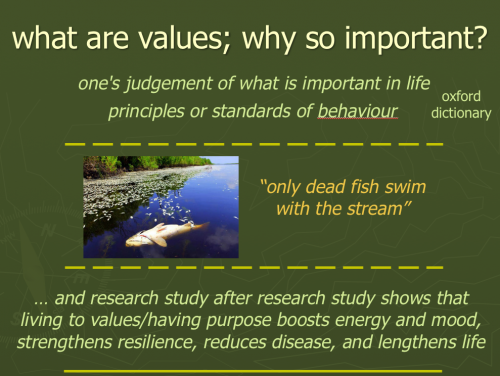
2nd course component: The ENHANCE training also began early on introducing Self-Determination Theory (S-DT) and used it as a central theme throughout the intervention. We too will do this, and this first evening we began by looking at S-DT Needs. In the earlier blog post on questionnaires, I wrote "One of the two questionnaires we'll be using throughout this training assesses how well we're getting our key psychological needs met. It's based on "Self-determination theory", which is an excellent way of approaching wellbeing and a central theme through the whole of this course. We will be using the recent "Psychological needs satisfaction measure (NSM)". On the back of the sheet, figures from Study 2 down at the bottom of the page give you some idea of how you're scoring compared with what may well be a roughly comparable group of people. To flourish we want to score highly, quite possibly in the top 15% of the population. People who are meeting their needs for Autonomy, Competence, Relatedness & Beneficence strongly will tend to experience higher well-being. Those who are frustrated in trying to meet these needs will tend to experience higher ill-being. It's like monitoring our 'psychological diet'. Tracking how we're doing with these needs and making changes to meet them better is likely to be a very sensible thing to do. It gives us an excellent compass to check whether our lives are on track. Below is a slide illustrating the needs. You can download the four slides we'll be using (First two & second two) - they can be printed out as a 2-miniatures-to-a-page double-sided handout. And here is a link to a 7 minute video clip where I talk through the four slides in more detail.
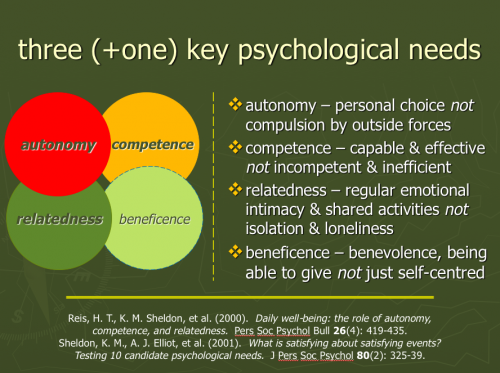
So you can see how these two major course components - ENHANCE Training's early emphasis on Shalom Schwart's Values research, and too the central theme of Self-Determination Theory & the Four Key Psychological Needs leads to the core message - in our How to Live Well Training - to focus on qualities of Spine and Heart:
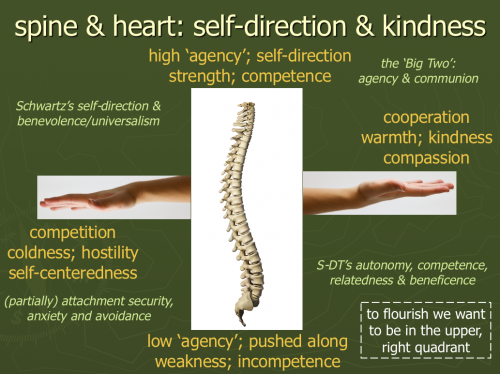
3rd course component: The third key course component is to take qualities of Spine and Heart out into our lives. Spine - Self-Direction & Autonomy - demands we consider what is genuinely most important for us ... what makes our heart sing? This post started with the Hasidic rabbi Susya's quote "When I get to heaven, they will not ask me 'Why were you not Moses?'. They will ask 'Why were you not Susya? Why did you not become what only you could become?'" So we began to complete the "Funeral speeches" exercise (The "80th birthday party exercise" is an alternative if you feel a bit squeamish thinking about your funeral). The request is to consider your life as made up of a number of roles - some linked with your relationships (e.g. Friend, Partner, Relative, etc), some with your work (e.g. Worker, Manager, Service Provider, etc), and some linked with self-care - what you do to keep yourself healthy & vital (e.g. Exercise, Diet, Meditation, etc). I personally also put in a role that I label Admin, which covers responding to emails/texts/letters, managing finances, looking after the house, and so on. There are horizontal rows on the sheet for up to eight roles. You can divide your activities into whatever roles seem to fit best for the way you lead your life. You don't have to have as many as eight, but I suggest you explore keeping to no more than eight (at least when you complete this exercise this time). As an example, currently the roles I personally am using are Relationships - 1. Partner, 2. Father/Grandfather and 3. Friend/Relative; Work - 4. Clinician and 5. Teacher; 6. Admin; 7. Self-Care Psychological/'Spiritual' and 8. Self-Care Physical. There isn't a right or wrong about this, but Self-Determination Theory shows clearly that we need to honour all four of our key Needs (Autonomy, Competence, Relatedness & Beneficence) to optimise Wellbeing and function at our best.
Once you have the Roles you're working with written down the left hand column on the sheet, the request is then to imagine it's your funeral (or 80th birthday party). For each Role, choose someone who knew you in the Role. Sometimes this will be a real person who might genuinely speak at your funeral (e.g. Co-Worker, Partner, Child, etc), sometimes you'll need to allow a bit of 'time travel' (e.g. imagining a dead parent talking about what kind of Son or Daughter you were), and sometimes you may imagine someone 'generic' or who doesn't yet exist in this role (e.g. Generic Co-Worker, Patient/Client/Customer, Someone who knew the extent of your Self-Care, a possible future Partner or Child, and so on). Now, for each Role, imagine the relevant person giving a short 'eulogy', a 'tribute' honouring you at your funeral (or 80th birthday), saying how really well you lived this role. Imagine you have fulfilled what you most wanted to fulfil ... that in this role, you managed to become & live how you would have most wanted to in this area of your life. If you had achieved this, what would you most want the person giving the eulogy to say about how you were? It's probably sensible to complete this quite quickly ... maybe take just two or three minutes per Role. You can then go back and add/change anything you want to later. Remember this isn't how someone might speak about you in this Role just now ... it's how you would really want them to be able to speak about you if you manage to live 'your dream' and be the person you would most want to be in this Role.
Our life can be thought of as a tree. Our Values are the Roots of the tree ... everything else grows from this. Our Roles are the Trunk of the tree ... how we show ourselves in the world. Our Goals are the tree's Branches. It's likely to be so much better for our lives if these Life Goals grow up clearly connected to our Values ... clearly a manifestation of Self-Direction, Benevolence & Universalism. What we'll do in the weeks ahead is look at what we want our focus to be now in each of these Roles, so that when we come to the end of our lives it's truly likely that we will have achieved and be remembered in the ways that 'make our hearts sing'.
And here are details of the "Home practice" requests for this week:
1.) We focused a lot on Values at this first session ... and linked this with self-determination theory's key Needs. I asked you to use three methods of deepening our sense of the crucial importance of self-direction, autonomy, determination, courage (we'll soon add the other more prosocial component to this central emphasis on Spine and Heart). One was to use a quotation ... either from the "Using physical reminders to 'wake up' (spine)" list or from your own favourite quotes. I suggested it would probably be helpful to carry it with you during the day and keep it by you at night ... reading it & thinking about the words regularly.
2.) A second way I suggested for deepening our connection to Spine is to do a simple 10 minute "Values writing exercise (1)" .
3.) And for the third of these deepening Spine connection exercises ... please try to practise this "12-breath mini-meditation exercise" a couple of times daily. The recording is simply to remind you of the structure of the exercise. When you're doing the practice on your own, link it to 12 of your own breaths. Additionally once daily please try to practise a slightly longer 5-6 minute 'twice through' version of the meditation. It's likely to be easier to remember these practices if you link them to events already anchored firmly in your days ... for example before/after meals, before leaving/after returning to your home, at bedtime, etc.
4.) We also began to speak about looking at roles & goals. I said values can be seen as the roots of our lives, our main roles as the tree trunk, key goals for each role as the branches, and the actions necessary to achieve the goals as the leaves. Here is the "Funeral speeches exercise" which you began filling in here. This helps us identify the main roles of our lives and central ... autonomous, self-directed ... goals for these roles. I suggested completing the sheet quite quickly initially ... and then filling it in a bit further on a second time through, if you want to.
5.) Finally, please glance back over the 10-page handout you were given yesterday and on the last page "Week one reflection sheet", jot down how you found the evening ... especially what felt most interesting or important or useful for you.
So these are the home practice requests for this first week of the course. Good luck!
For the details of the next of this 10-session sequence, see "How to live well: 2nd meeting - mindset, motivation, positive emotions, exercise & sleep".
